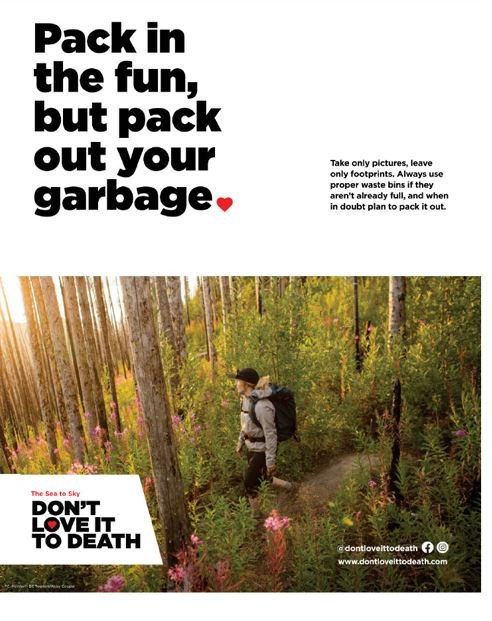An exponential increase in litter, wildlife conflicts environmental degradation caused by poor human behaviour, and illegal land use in the Sea to Sky region has prompted a campaign urging people to tread lightly and minimize impact.
The campaign is an initiative of the Sea-to-Sky Destination Management Council, which was created in early 2020 to implement the Sea-to-Sky Destination Development Strategy. The Council is comprised of community representatives from the Sea-to-Sky planning area, as well as Indigenous Tourism Association of British Columbia, B.C. Parks, the Ministry of Jobs, Economic Recovery and Innovation, and the Ministry of Forests.
Starting this month, visitors travelling the Sea-to-Sky Corridor, which spans from North Vancouver and Bowen Island north through Lillooet, will see signage encouraging locals and visitors to behave more responsibly when enjoying the outdoors and the communities.
Signage will be placed in visitor centres, in parks, on trailheads and beaches, using images of the Sea-to-Sky region with thought-provoking messages reminding residents and visitors to be aware of their impact, and respect the environment using the tagline “Don’t Love it to Death.”
The creative, developed by Whistler marketing agency Origin, will include printed materials provided to local businesses, posters, videos, and a social media program @dontloveittodeath.
The campaign’s webpage www.dontloveittodeath.com includes practical resources on how people can reduce their footprint by enjoying the outdoors and community assets in a responsible, sustainable, and legal manner. “The “Don’t Love It to Death” awareness campaign is designed to get people to think about their actions and the impact they’re having on the environment, wildlife and the people around them,” said Karen Goodwin, Vice President, Destination & Market Development, Tourism Whistler.
“We want to change people’s behaviour by encouraging them to make better travel and recreational decisions that protect and preserve the places we all love.”

Traffic along the Sea-to-Sky Highway has increased five percent every year since 2006, resulting in a dramatic increase in litter and other issues. Negligent and illegal behaviour is disrupting visitors and locals, often having dire consequences for wildlife and natural areas.
Excessive litter and garbage topped the list of nine “pain points” identified by approximately 600 Sea-to-Sky community leaders and residents who responded to two surveys and participated in 12 stakeholder input sessions on urgent regional issues. Additional concerns include environmental and resource degradation, human waste along public trails and in parks, illegal and disrespectful land use such as trespassing and damage to Indigenous cultural sites, transportation issues such as excessive traffic and inadequate parking, crowding and overuse, unprepared hikers and campers resulting in a spike in search and rescue calls, as well as wildlife conflicts due to human negligence.
These behaviours have had significant impacts in the region over the short and long-term, including:
Highway contractors working on the Sea-to-Sky Highway had to increase the frequency of litter clean-up from weekly to daily over the past decade, particularly during the busy summer months.
In March 2022, Divers for Cleaner Lakes and Oceans (DFCLO) removed 516 kilos of garbage off Bowen Island in just one day.
Over the past year, the volunteer run Whistler Search and Rescue received more than 110 requests for assistance, according to its annual manager’s report, compared to 92 during the same period the previous year. North Shore Rescue received 226 calls for assistance in 2021, beating the previous annual record of 151 set in 2020.
In August 2021, a bear was euthanized after it was seen accessing unsecured food in a tent around the Cat Lake Recreation Sites and Lake in the Squamish District.
On May 27, 2022, the Cat Lake Recreation Sites and Lake was closed for approximately five weeks due to an aggressive bear actively seeking food from campers and entering tents to acquire it.
“People genuinely love the Sea-to-Sky region,” added Lesley Weeks, Executive Director, Tourism Squamish. “We all have a duty of care to protect our natural environment and cultural heritage for future generations. Ultimately, we want to instill an ethic of accountability and respect among locals, outdoor enthusiasts and the travelling public so that everyone can enjoy the many opportunities this majestic region has to offer.”






Ihor Zalubniak says
Who comprises the Sea to Sky Destination Management Council?